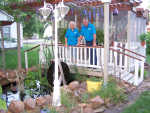'I'm glad I could serve' Frank Arnold looks back on 42 years in National Guard

By Neoma Foreman
Special to the Daily Mail
"I enlisted in the National Guard in May of 1967 and was called to serve in October. I wanted to go because I had two cousins and my two best friends killed in Vietnam," said Frank Arnold, of his years of service.
Arnold stayed with the National Guard for 42 years, working at Camp Clark for 35 years. He was maintenance supervisor for the last five years. "That was my job during the week and on the weekend I went to camps and drills," he said.
Some of the duties Arnold fulfilled were as an armored crewman, supply, field medic, maintenance, and administration. He took two out-of-country tours -- one to Germany and one to Guatemala, for 30 days. He also spent two weeks serving in Alaska. They were on an island near Ketchikan where they were building a road. He found it a beautiful place, but had to leave two days early because he was assigned to escort a soldier home who was declared mentally unfit for military duty.
"He just went over the brink and would wander off. I lost him for a few minutes in the Las Vegas airport. It was like keeping track of a 5-year-old," Arnold said.
One of his most "interesting" tours was to Louisiana for 30 days, immediately after Hurricane Katrina struck the Gulf Coast.
"I got the call on Thursday and headed out on Saturday morning. We were the first National Guard in there. There were very few police and we went right in as Military Police. We worked with the sheriff of Jefferson Parrish and did patrol. The looters were awful. There was a lot of nasty stuff that never made the papers -- like bodies floating in the water. There were so many gangs. If we were in an emergency vehicle we were supposed to have an orange sticker. One car was stopped that the whole back seat was full of weapons they had stolen from a museum. They were confiscated and the bunch sent to Alexandria because there were no jails. The storm had devastated everything. There was so much looting. We did what we could.
"If it was a misdemeanor, we slapped their hands verbally, and sent them on their way. The only way we could get fuel was from a ship. Once we had filled up and a carload of thugs tried to get us to pull over. We pointed weapons at them and they were glad to leave. We carried live ammo all the time and were ready to go. Some wanted us to only use blanks, but our commanding officer would have none of that. He said he wouldn't put his people in that danger. It was live ammo or we were going home. We stayed," Arnold said.
Along the way, Arnold went to many states for camp including Texas, Virginia, and South Carolina, and had many experiences from which he learned much. While in El Paso, Texas, his wife's mother was having heart surgery. He called to ask about her and as they were talking, they crossed the Bridge of America to Mexico. A person came on his phone and asked if he wanted to continue the call. He said yes, but paid for it -- literally. The call cost 18 cents on the American side and $34 for a few minutes on the Mexican side.
In another adventure, Arnold also went north of Baton Rouge, La., for two weeks just after Hurricane Gustav. His duty there was checking homes for stranded people or those who needed help. He was on duty for 16 days in Jefferson City during the flood. "People were so afraid we weren't getting enough food. They all wanted to do something to help us. One woman drove up in a van in her wedding dress. She brought the rest of her wedding cake to share with us. Another pair of older ladies made two boxes of sandwiches. I told them we had enough food and their faces fell so badly I backtracked and told them we loved sandwiches. It was their way of helping in a crisis -- and I know our people here would do the same."
When Arnold entered the National Guard, it was in the 203rd Armor and when he retired in June of 2009 it was called 203rd Armor Engineers.
"Technology has probably been the biggest change. Most of the equipment is armored for the safety of the soldier. Everything is operated off a laptop computer and a GPS system. We can track convoys and keep track of where every vehicle is located. The Blue Force Tracker is an amazing system. Most business is conducted with a cell phone. Probably 95 percent of the soldiers have personal cell phones. A big change is soldiers now have contact with their families. There are a lot of cameras and you can see them on your laptop. When I was in Guatemala, I called home every night."
Another area in which changes have developed is in the discipline of soldiers. "Since the Army is all volunteer, you have to manage instead of order. Another change is patriotism. It went from patriotic to non-patriotic, when no one wanted to mention they were with the military. But after 9-11 soldiers are ready to defend their country and people now respect the military and thank them for defending their country."
Frank said he "Enjoyed the military. It was a good career and I'm glad I could serve."
